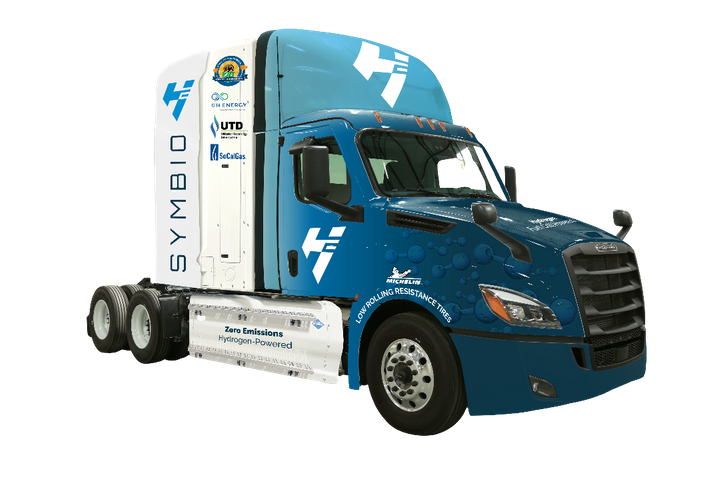Trucker Access › Forums › Diesel News › Symbio, Michelin to Unveil Hydrogen-Powered Truck at ACT Exo 2024 – Fuel Smarts
- This topic has 0 replies, 1 voice, and was last updated 11 months, 1 week ago by
 EazyRiDer66.
EazyRiDer66.
-
AuthorPosts
-
May 16, 2024 at 6:30 pm #20763
 EazyRiDer66Keymaster
EazyRiDer66Keymaster

With a 70kg hydrogen tank onboard, Symbio’s hydrgen fuel cell Freightliner Cascadia is capable of running over 450 miles per fueling event.
Two years after announcing its H2 Central Valley Express project, hydrogen fuel cell developer Symbio has unveiled a hydrogen-fueled, regional-haul Class 8 truck. The vehicle’s propulsion system was developed and integrated by Symbio in California. The truck is outfitted with next-generation EV specific tires that offer improved fuel economy and reduced wear from Michelin.
“We are thrilled to present the cutting-edge, innovative Symbio’s 400 kW heavy duty fuel cell stack that enables a significant engine weight reduction without compromise on performance,” said Rob Del Core, general manager, Symbio North America. “This hydrogen-powered class- 8 fuel cell truck is testimonial of Symbio’s fuel cell technology leadership and system integration know-how. We thank the CEC, GTI Energy, and project partners for their support and dedication in making this sustainable and ambitious project a reality.”
The H2 Central Valley Express Project
Symbio’s H2 Central Valley Express project aims to develop and demonstrate a hydrogen fuel cell truck that matches the performance of a 15-liter diesel truck, the company said. The ulitamate goal is to provide a zero-emission solution for demanding regional-haul trucking operations.
Accordingly, Symbio has designed, developed, and integrated a heavy-duty long-haul fuel cell powertrain into a Freightliner Cascadia class-8 tractor.
The Cascadia’s diesel engine has been replaced with Symbio’s 400 kW StackPack fuel cell system. This technology consists of four packaged sub-systems of Symbio’s proprietary stack technology.
[embed]https://www.youtube.com/watch?v=bZhcW395UaM[/embed]
Symbio said the system has logged more than five million test miles.
The heavy-duty 400kW power system’s control strategy is optimized to deliver superior energy balance and power, meeting the functional requirements of the diesel truck. With a 70kg hydrogen tank onboard, the fuel cell truck is capable of over 450 miles per fueling event.
According to Symbio, hydrogen is perfectly suited to decarbonize heavy-duty mobility, bringing distinctive advantages including long range, higher payload, fast refueling and a reduced total cost of ownership. It is particularly attractive for highly utilized commercial vehicles which need a longer driving range and faster refueling time to maximize uptime.
Michelin Low-Rolling Resistance Tires
Michelin (a co-shareholder of Symbio) is providing next generation low-rolling resistance tires for the truck. The tire supplier said these tires combine safety, longevity and improved fuel efficiency, thus enhancing the total cost of ownership of the vehicle.
The aim of this demonstration is to test the low-rolling resistance tires on a zero-emission truck, Michelin said. The tires are designed to handle higher torque loads under acceleration, which are different from those of internal combustion engine trucks.
It is expected that the data collected will help determine the improvements needed to develop a tire applicable for the needs of hydrogen trucks.
“Hydrogen plays a key role in Michelin’s all-sustainable approach and Symbio brings us with this announcement one step closer to becoming a world leader in hydrogen systems for mobility,” said Alexis Garcin, president and CEO, Michelin North America. “Equipped with Michelin low rolling resistance tires and with the Symbio Hydrogen fuel cells, this breakthrough will accelerate the transition to a greener long haul transportation with extended range and fast charging time.”
A Year-Long Test Program
Expected to hit the road by the end of 2024, the truck will run for 12 months on a challenging 400-mile (650 km) route between the Inland Empire and Northern San Joaquin Valley.
The demonstration route consists of four distinct and challenging operating sections running from Los Angeles, through Grapevine climb, with a 235-mile run through California’s Central Valley. The vehicle will be storing 66.8kg of 700-bar hydrogen onboard with 2 intra-route fueling events in Central Valley.
Project partners include GTI Energy, a leading technology development organization creating impactful solutions that shape energy transitions, who leads the grant administration and program management, provides technical insight, and performs data collection and analysis.
Other partners include Total Transportation Services (TTSI), the fleet operator, who will demonstrate the truck in revenue service, and Frontier Energy, who will conduct community outreach. Southern California Gas Company (SoCalGas) and Utilization Technology Development (UTD), a global collaboration of leading gas utilities, provide funding support.
-
AuthorPosts
- You must be logged in to reply to this topic.